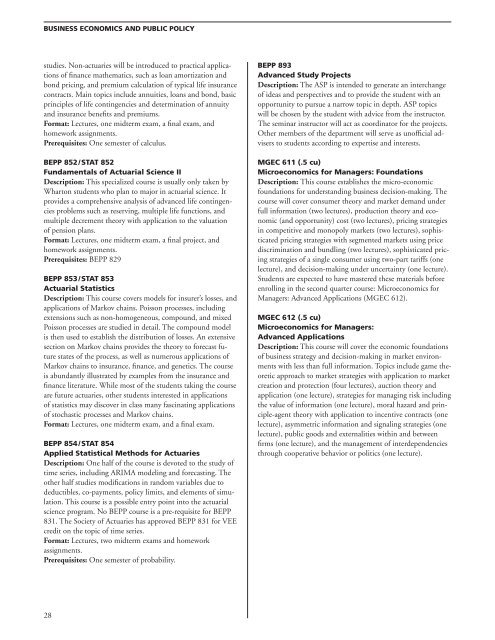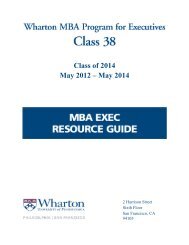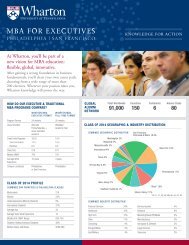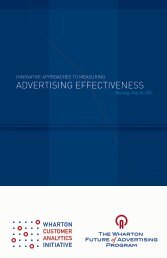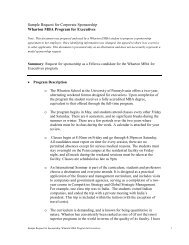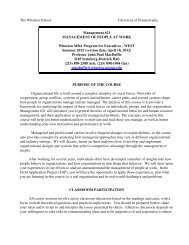Explore Options; Plan Your MBA Academic Program
Explore Options; Plan Your MBA Academic Program
Explore Options; Plan Your MBA Academic Program
You also want an ePaper? Increase the reach of your titles
YUMPU automatically turns print PDFs into web optimized ePapers that Google loves.
BUSINESS ECONOMICS AND PUBLIC POLICY<br />
studies . Non-actuaries will be introduced to practical applications<br />
of finance mathematics, such as loan amortization and<br />
bond pricing, and premium calculation of typical life insurance<br />
contracts . Main topics include annuities, loans and bond, basic<br />
principles of life contingencies and determination of annuity<br />
and insurance benefits and premiums .<br />
Format: Lectures, one midterm exam, a final exam, and<br />
homework assignments .<br />
Prerequisites: One semester of calculus .<br />
BEPP 852 / STAT 852<br />
Fundamentals of Actuarial Science II<br />
Description: This specialized course is usually only taken by<br />
Wharton students who plan to major in actuarial science . It<br />
provides a comprehensive analysis of advanced life contingencies<br />
problems such as reserving, multiple life functions, and<br />
multiple decrement theory with application to the valuation<br />
of pension plans .<br />
Format: Lectures, one midterm exam, a final project, and<br />
homework assignments .<br />
Prerequisites: BEPP 829<br />
BEPP 853 / STAT 853<br />
Actuarial Statistics<br />
Description: This course covers models for insurer’s losses, and<br />
applications of Markov chains . Poisson processes, including<br />
extensions such as non-homogeneous, compound, and mixed<br />
Poisson processes are studied in detail . The compound model<br />
is then used to establish the distribution of losses . An extensive<br />
section on Markov chains provides the theory to forecast future<br />
states of the process, as well as numerous applications of<br />
Markov chains to insurance, finance, and genetics . The course<br />
is abundantly illustrated by examples from the insurance and<br />
finance literature . While most of the students taking the course<br />
are future actuaries, other students interested in applications<br />
of statistics may discover in class many fascinating applications<br />
of stochastic processes and Markov chains .<br />
Format: Lectures, one midterm exam, and a final exam .<br />
BEPP 854 / STAT 854<br />
Applied Statistical Methods for Actuaries<br />
Description: One half of the course is devoted to the study of<br />
time series, including ARIMA modeling and forecasting . The<br />
other half studies modifications in random variables due to<br />
deductibles, co-payments, policy limits, and elements of simulation<br />
. This course is a possible entry point into the actuarial<br />
science program . No BEPP course is a pre-requisite for BEPP<br />
831 . The Society of Actuaries has approved BEPP 831 for VEE<br />
credit on the topic of time series .<br />
Format: Lectures, two midterm exams and homework<br />
assignments .<br />
Prerequisites: One semester of probability .<br />
28<br />
BEPP 893<br />
Advanced Study Projects<br />
Description: The ASP is intended to generate an interchange<br />
of ideas and perspectives and to provide the student with an<br />
opportunity to pursue a narrow topic in depth . ASP topics<br />
will be chosen by the student with advice from the instructor .<br />
The seminar instructor will act as coordinator for the projects .<br />
Other members of the department will serve as unofficial advisers<br />
to students according to expertise and interests .<br />
MGEC 611 ( .5 cu)<br />
Microeconomics for Managers: Foundations<br />
Description: This course establishes the micro-economic<br />
foundations for understanding business decision-making . The<br />
course will cover consumer theory and market demand under<br />
full information (two lectures), production theory and economic<br />
(and opportunity) cost (two lectures), pricing strategies<br />
in competitive and monopoly markets (two lectures), sophisticated<br />
pricing strategies with segmented markets using price<br />
discrimination and bundling (two lectures), sophisticated pricing<br />
strategies of a single consumer using two-part tariffs (one<br />
lecture), and decision-making under uncertainty (one lecture) .<br />
Students are expected to have mastered these materials before<br />
enrolling in the second quarter course: Microeconomics for<br />
Managers: Advanced Applications (MGEC 612) .<br />
MGEC 612 ( .5 cu)<br />
Microeconomics for Managers:<br />
Advanced Applications<br />
Description: This course will cover the economic foundations<br />
of business strategy and decision-making in market environments<br />
with less than full information . Topics include game theoretic<br />
approach to market strategies with application to market<br />
creation and protection (four lectures), auction theory and<br />
application (one lecture), strategies for managing risk including<br />
the value of information (one lecture), moral hazard and principle-agent<br />
theory with application to incentive contracts (one<br />
lecture), asymmetric information and signaling strategies (one<br />
lecture), public goods and externalities within and between<br />
firms (one lecture), and the management of interdependencies<br />
through cooperative behavior or politics (one lecture) .


